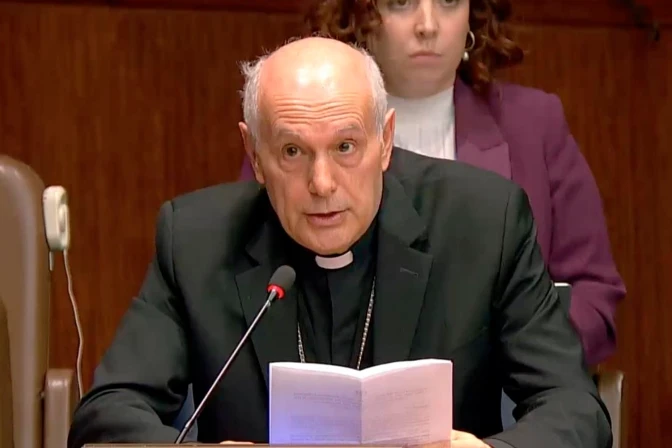

null / Credit: Andrius Zemaitis/Shutterstock
Washington, D.C. Newsroom, Sep 20, 2025 / 08:00 am (CNA).
Here is a roundup of Catholic world news from the past week that you might have missed.
Bomb squad called after Christian nonprofit CEO in Ireland receives anthrax
The Irish Army bomb squad blocked off part of Dublin city center this week after David Quinn, CEO of the Iona Institute, received a letter in the mail containing a white powdery substance purporting to be anthrax. In a post on social media, Quinn wrote: “Received this in the post today. Nice,” sharing an image of a letter containing the white substance, which read: “Happy anthrax.”
Received in the post today. Nice. pic.twitter.com/PsEfUTV4OY
— David Quinn (@DavQuinn) September 16, 2025
“I opened up the thing about 1 o’clock and all this powder comes out,” Quinn told the Irish Independent. “It was just addressed ‘Iona Institute,’ so it’s basically targeting me and Breda O’Brien,” he continued, adding: “I can only imagine that it’s somebody with a hang-up about the Catholic Church.”
Catholic monastery in Corfu closes after 381 years due to ‘lack of vocations’
The Capuchin Fathers monastery in Corfu, Greece, has been shut down after nearly 400 years due to a “lack of vocations,” according to the Greek Reporter.
A final Mass at the monastery was celebrated by the Catholic archbishop of Corfu, Georgios Altouvas, this week, the report said, noting that “worshippers who had long turned to the friars for guidance and support wept as they bid farewell to the last brothers.” The order reportedly said they could no longer find friars to continue running the monastery’s operations.
Mass attendance in Austria goes up, disaffiliation goes down
Mass attendance in Austria has gone up, according to statistics reported by the Pillar on Sept. 17, and the number of individuals filing for formal disaffiliation from the Church has gone down in the past year.
In addition to the positive attendance trend, the annual statistics also found a rise in Church tax revenue. According to the Pillar, the data reflects a rise from 309,000 worshippers in the spring of 2022 to 378,797 in the fall of 2024. “Attendance rose in the Sankt Pölten Diocese, led by Bishop Alois Schwarz, from 40,193 and 42,652 in 2023 to 63,520 and 46,179 in 2024. In the Vienna Archdiocese, the increase was from 56,906 and 63,157 in 2023 to 78,806 and 84,621 in 2024,” the Pillar reported.
Church in Nepal joins government in condemning unrest
The apostolic administrator of the Vicariate of Nepal, Father Silas Bogati, has signaled approval of the new interim government led by former Chief Justice Sushila Karki amid ongoing anti-corruption protests that have left at least 72 dead, according to UCA news.
“We as a Catholic community have confidence in Sushila Karki, who, among other things, in the past, when she was still a lawyer, defended one of our priests and some religious sisters who had been wrongly accused in several court cases,” Bogati said of the country’s new interim leader. “We have a good opinion of her and trust in her work in the coming months to act in accordance with the rule of law and the democratic principles of justice and legality.”
Democratic Republic of Congo bishops denounce latest killings
The National Episcopal Conference of Congo has condemned the new wave of deadly attacks in the eastern region of the Democratic Republic of Congo, decrying what they describe as the growing trivialization of human life in the Central African nation, according to ACI Africa, CNA’s news partner in Africa.
In a Sept. 16 statement shared with ACI Africa, the bishops highlighted recent attacks and expressed concern about the “evolution of the security situation, particularly in the eastern part of the country, which continues to suffer enormous loss of human life as a result of various forms of violence.” The deadliest incident, the Church leaders said, occurred Sept. 8 when at least 102 people were killed in Ntoyo village, Lubero Territory.
Benin bishop: Jihadist attacks ‘a constant threat to our pastoral activities’
Bishop Martin Adjou Moumouni of the Diocese of N’Dali in the West African country of Benin is speaking out after jihadists carried out an attack on a local village, targeting its police station, looting homes, and taking at least six hostages, according to statements the prelate made to Fides News Agency.
“Nigerian Jihadists have long been spreading terror in our diocese, especially in rural areas,” the bishop said. “We were forced to suspend pastoral activities in the villages, and even in the city, I asked the priests of my diocese to hold services only during daylight hours, as insecurity increases with nightfall.”
Cardinal Vincent Nichols signs joint statement to end war in Gaza
The president of the Catholic Bishops’ Conference of England and Wales, Cardinal Vincent Nichols, has signed a joint statement with Catholic, Anglican, Orthodox, and other church leaders from England and Ireland, pushing for an end to the war in Gaza.
“We fear that the unfolding assault on Gaza City will only intensify the human suffering and misery as already malnourished and traumatized families are forced, yet again, to flee the horrors of this war,” the statement reads. “This deadly escalation is futile and must stop.” The statement comes ahead of the United Nations’ International Day of Peace on Sept. 21, for which many Christian leaders have organized a day of prayer and public witness.
Christians in Syria divided over police presence at churches
Syria’s Ministry of the Interior has tightened security measures around churches by deploying armed guards at their entrances following the St. Elias Church bombing in June, according to a Sept. 16 report from ACI MENA, CNA’s Arabic-language news partner.
“Many believe that the guards give them a sense of comfort and reassurance during prayer, as it provides a layer of protection,” said Joseph Kneifati, a deacon in the Melkite Greek Catholic Archdiocese of Aleppo. “But on the other hand, the church is our second home, sometimes even our first.”
“When we enter and are asked where we’re going, it feels less natural,” he added. “Since childhood, we’ve been accustomed to attending church freely and simply. The presence of armed personnel at the doors has erased that spirit.”
Read More


